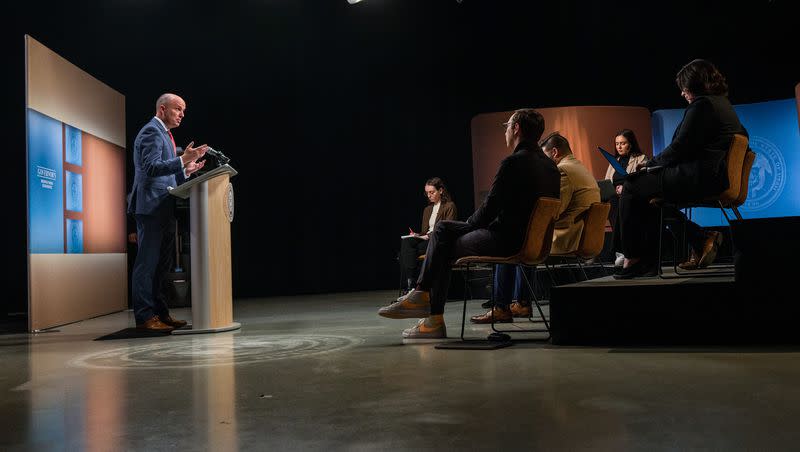Gov. Spencer Cox: Utah Legislature plans to ban colleges from forcing new hires to sign ‘political’ diversity statements

- Oops!Something went wrong.Please try again later.
Gov. Spencer Cox said he expects the Utah Legislature to ban state colleges and universities from requiring new hires to sign “diversity statements,” and said he plans to sign the bill if it comes to his desk.
“I think it’s bordering on evil that we’re forcing people into a political framework before they can even apply for a job in the state,” he said.
Cox called the diversity, equity and inclusion statements “very political,” during his monthly televised PBS press conference on Wednesday.
“I thought for sure that’s not happening here in the state of Utah — it is happening here in the state of Utah. But I can assure you after this legislative session, it will not be happening here,” he said.
Cox said discussions with members of the state Legislature are already underway about how to address DEI issues on college campuses, and the conversation includes college presidents and members of the state Board of Higher Education.
The focus of the conversations, he said, is on how to help students who are struggling.
Cox said he thinks the number of people working in DEI positions on public campuses is “astounding,” and said they haven’t shown they can help improve student outcomes.
“This is not a zero sum game, and I’m so tired of the false choices,” he said, pointing to rural students and young men as populations who are also attending college at lower rates. He said it wasn’t true that if “you’re opposed to the identitarianism of DEI then you’re racist.”
“I care deeply about our brown kids and our Black kids. I care deeply about all of our children, and we should be trying to help them.”
The racial makeup of Utah and the state’s public universities is changing, Cox said. There are now 17 states less diverse than Utah, including Ohio, and the students who attend Utah’s public colleges and universities generally reflect that diversity, he added.
Cox was quick to say Utahns should understand that while he might not like some of what’s been done in the name of DEI, it doesn’t mean he doesn’t value diversity.
“I believe that diversity is very important, and I think it is a worthy goal. I think that inclusion is absolutely critical. We value and we pride ourselves on being a state that is incredibly welcoming with refugees and immigrants and others,” he said.
“We should celebrate our different cultures, different backgrounds, different experiences, different languages — all of those things make us richer and make us better,” he said. “That’s why diversity is so good. All of the studies show that if you get people who are different working together to solve a problem, they can actually solve that problem better than people who are the same.”
Related
Why diversity work on campus is essential for pluralism — and our democracy
Governor calls on Utah colleges to ensure free speech rights
Cox and state legislators are likely to receive pushback from those who believe DEI programs have helped minority students.
Following an earlier statement by Cox on DEI, Jeanetta Williams, president of the NAACP Salt Lake Branch, released a statement on Dec. 15 saying she was “disheartened to hear Gov. Cox talk negatively about Diversity in Colleges.”
“I challenge the governor to get diversity groups, colleges and legislators together in a room to discuss diversity in higher education before he makes another public statement against diversity in higher education. He cannot come out and make a claim that Diversity on college campuses is divisive without talking to the other side,” she said.
Utah isn’t the only state looking at reining in DEI offices on college campuses.
Recently in Wisconsin, Republicans in the state Legislature cut funds for DEI offices at public colleges and universities, then held back money for pay increases and infrastructure improvements on those campuses until the schools agreed to freeze hiring for DEI positions, according to National Review.
The state’s flagship school, the University of Wisconsin-Madison, agreed to a list of legislative demands in exchange for increased funds, including soliciting donations for a new endowed chair for “conservative political thought, classical economic theory, or classical liberalism, depending on the donor’s interest,” Wisconsin Public Radio reported.
Cox said he also hopes to see greater intellectual diversity on college campuses.
“This should be a priority for every college campus in the country. If you really care about truth and the reasons that universities exist in the first place — not to be vessels for political correctness or sameness, but to be seeking truth and finding truth and allowing for debate, even unpopular debate... — you have to have some intellectual diversity on campuses,” he said.
He said forcing people to sign DEI statements as part of the hiring process is a political endeavor and decreases intellectual diversity.
“I think you will definitely see more from me and my office and from the Board of Higher Ed when it comes to pushing our campuses to have more intellectual diversity and freedom of speech on campuses, with the institutions themselves staying neutral.”

